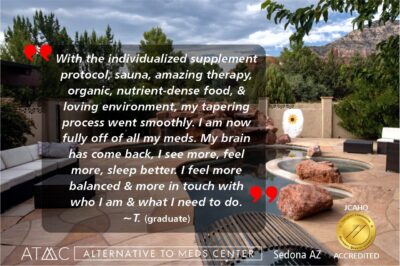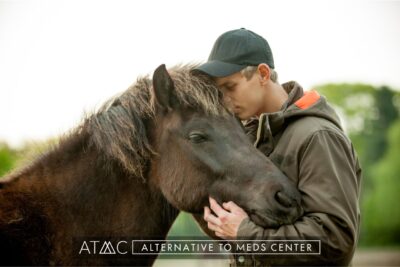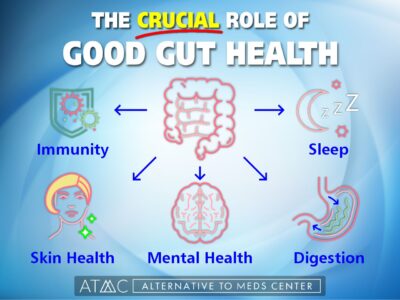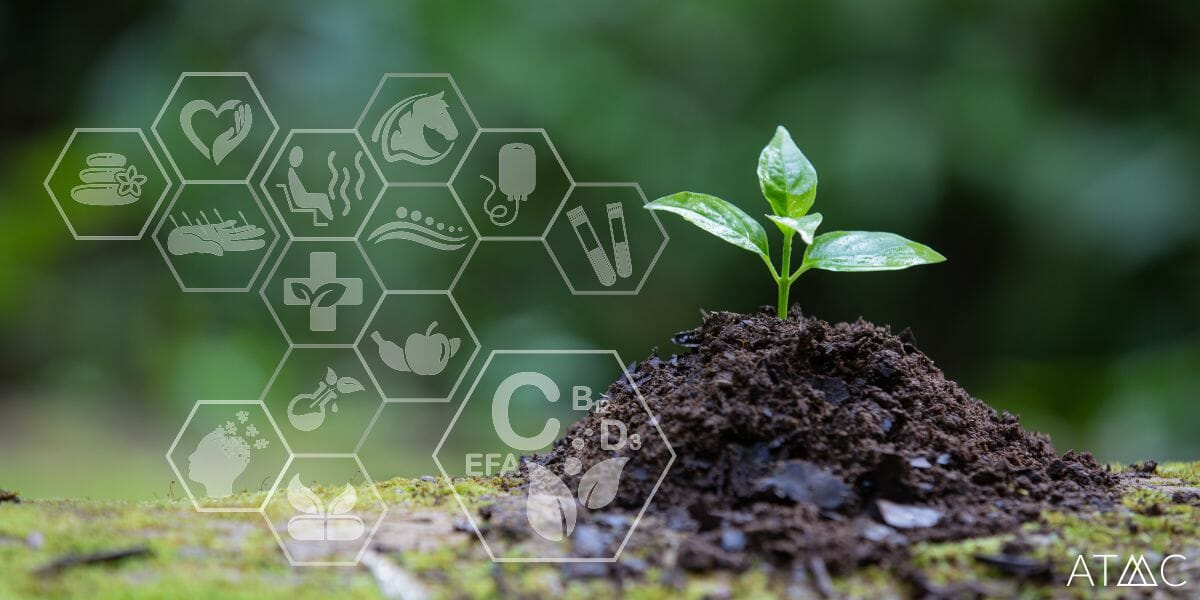Last Updated on February 2, 2024 by
Alternative to Meds Editorial Team
Medically Reviewed by Dr Samuel Lee MD
Last Updated on February 2, 2024 by
Alternative to Meds Editorial Team
Medically Reviewed by Dr Samuel Lee MD
Today, doctors prescribe uncountable medications to treat every feeling or symptom, condition, or label under the sun. Unfortunately, prescription drug use often introduces long-term dependency and other complications. Medications number 20,000 or more, and according to the industry’s latest statistics, 66% of adults in the US take prescription drugs. And, the numbers are still rising.3

Plan for success. When someone sets the goal of becoming medication free, a plan should be developed with a doctor or licensed specialist, and typically, there will be a lot of questions or worries. At Alternative to Meds Center, we have helped thousands of individuals and families develop a plan to approach recovery for their loved ones.
It’s only natural to feel uncertain about these and other questions. Some who became dependent on medication, have been through such difficult circumstances that they don’t believe they will ever recover. Clearly, not everyone should completely eliminate their medications. Most can at least substantially reduce their dosage, and many can eliminate it completely. This is because the symptoms can be addressed in other ways than numbing drugs. Enough time and adequate adjunctive treatments must be made available so that the body can adjust, and thereby avoid protracted withdrawal or a return of depression, anxiety, insomnia, or other symptoms. The aims of Alternative to Meds Center include helping a person become free of medication but also becoming free of the symptoms that led to taking prescription drugs in the first place.
Alternative to Meds Center has helped thousands of people find hope and true recovery from Medication Withdrawal, drug side effects, and experience the benefits of discovering the actual underlying causes of their symptoms.
We offer a wealth of holistic treatment options, under medical guidance, that have proven to be effective. Our licensed treatment team develops a strategy that considers genetics, dietary needs, nutrient intake, addressing any toxic burden, and many other key factors in creating and maintaining overall balance in one’s mental, physical, and emotional state.
The holistic psychiatry approach used at Alternative to Meds Center is designed to help a person achieve a harmonious state of being. Focusing on the mind, body, and spirit, may sound a bit vague, but these concepts are very real, and structured treatment plans provide our clients with many more tools. Every individual treated at ATMC receives a battery of lab tests including neurotoxin testing, individualized nutrient protocols, neurotoxin removal, a corrected diet, restored gut health, acupuncture, QiGong classes, therapeutic massage, and other physical comfort therapies, plus one-on-one counseling, and a host of creative outlets and mindfulness activities. The goal of the program is to help the person develop a healthy routine for their life so that upon returning home from treatment, there is a solid foundation for continued healing. This all-encompassing approach also helps make a medication taper more bearable for someone who is attempting to become medication free.
There are many non-drug-based treatments that are as effective, and sometimes more effective, than medications alone. Here is a short list of some examples, with an expanded description below the list.
 CBT and other forms of counseling
CBT and other forms of counselingStudies such as the one published in the Indian Journal of Psychiatry describe the benefits of CBT (cognitive behavioral counseling) for reducing symptoms of depression, along with a decreased relapse rate, and for undoing the ongoing damage of self-destructive thought patterns.6
Acupuncture is known to have many health benefits and has been used for thousands of years as a form of treatment for various ailments. At Alternative to Meds Center, we find that acupuncture helps to bring a sense of calmness to the nervous system especially helpful for those going through our medication withdrawal program. Studies show that Acupuncture is highly beneficial in reducing anxiety, and imparts many positive physical benefits as well.7

There are multiple ways equine therapy can benefit a person in the healing process. The 2021 Journal of Clinical Psychiatry reported marked reductions in symptoms such as depression and PTSD from the use of equine-assisted therapy. And remarkably, these improvements were shown to be sustained at the 3-month follow-ups post-treatment.9
Holistic detox helps to purge toxins, drug residues, heavy metals, and waste products from the body. Toxins are largely fat-soluble making them tend to persist in the fat stores of the body. This remarkable example of an adjunctive treatment at Alternative to Meds Center entails various cleansing processes, plus chelation, combined with sauna. A blend of chelators and other nutrients is given to convert fat-soluble toxins to water-soluble so they can be safely flushed from the body. Sauna therapy is efficient for purging these elements, which safely eliminates the junk without taxing the liver or kidneys.10,11
Therapeutic massage has been well-validated as a beneficial adjunctive treatment in psychiatric settings, as reported in the 2018 Journal of Lifelong Learning in Psychiatry. For someone needing support during the medication withdrawal process, a massage can offer relief on multiple levels. Not only is a massage very relaxing and calming, but it has also been shown in clinical trials to reduce symptoms such as depression, anxiety, and other psychiatric symptoms. And, it also helps to release toxins. Anyone coming off medications safely, or who is suffering from unwanted mental health symptoms, or who seeks to enhance the process of toxin removal may benefit from implementing massage therapy as an effective and profoundly beneficial adjunctive treatment option.12
Glutathione is the major free radical scavenger in the brain and other parts of the body. Decreased levels of this important nutrient have mental health consequences and deficiencies of it have been found in virtually ALL psychiatric conditions, according to mental health researchers. This is why Alternative to Meds Center utilizes vaporized or nebulized glutathione in treatment to correct a deficiency. 13
Tai Chi and Qigong are very popular practices that help to achieve an overall sense of balance and wellness. According to a body of research14 that was published in the 2013 Journal of Psychiatric Clinics in North America,
“Two studies found that exercise is comparable with sertraline (Zoloft) in terms of efficacy for treatment of “major depressive disorder.” In studies comparing the benefits of Tai Chi and Qigong with general exercise, both interventions have been shown to have comparable effects at reducing anxiety.” ~Abbot/Lavretsky (2013)
In recovery from major symptoms like depression, anxiety, mood disorders, or stress, Qigong provides a time-tested and safe adjunctive treatment that helps many achieve a healthier version of themselves.
Many studies have shown the positive effects that can be gained from practicing yoga both in healthy subjects and for those suffering from psychiatric or other health issues. One study showed marked improvements in PTSD sufferers in quality of sleep, improved cognitive function and quality of life, and reduction in mental health symptoms. Yoga is a remarkable adjunctive treatment.15
At Alternative to Meds Center, our clients receive access to the top licensed holistic psychiatric program in the country. A well-rounded treatment philosophy not only helps a person in crisis to feel better but helps the person reduce mental health symptoms, in most cases without relying on drugs.
If you or a loved one need assistance with mental health symptoms, medication withdrawal, or environmental toxicity issues, we can help. Please call us anytime for more information on treatment programs, admissions, insurance coverage, and any other questions you may need answers to during your treatment planning phase.
1. Sachs GS, Gardner-Schuster EE. Adjunctive treatment of acute mania: a clinical overview. Acta Psychiatr Scand Suppl. 2007;(434):27-34. doi: 10.1111/j.1600-0447.2007.01056.x. PMID: 17688460.[cited 2023 July 12]
2. Sarris J, Ravindran A, Yatham LN, Marx W, Rucklidge JJ, McIntyre RS, Akhondzadeh S, Benedetti F, Caneo C, Cramer H, Cribb L, de Manincor M, Dean O, Deslandes AC, Freeman MP, Gangadhar B, Harvey BH, Kasper S, Lake J, Lopresti A, Lu L, Metri NJ, Mischoulon D, Ng CH, Nishi D, Rahimi R, Seedat S, Sinclair J, Su KP, Zhang ZJ, Berk M. Clinician guidelines for the treatment of psychiatric disorders with nutraceuticals and phytoceuticals: The World Federation of Societies of Biological Psychiatry (WFSBP) and Canadian Network for Mood and Anxiety Treatments (CANMAT) Taskforce. World J Biol Psychiatry. 2022 Jul;23(6):424-455. doi: 10.1080/15622975.2021.2013041. Epub 2022 Mar 21. PMID: 35311615. [cited 2023 July 12]
3. Singlecare Information Letter Prescription Drug Statistics 2023 [published online 2023] [cited 2023 July 12]
4. Wang D, Wang Y, Wang Y, Li R, Zhou C. Impact of physical exercise on substance use disorders: a meta-analysis. PLoS One. 2014 Oct 16;9(10):e110728. doi: 10.1371/journal.pone.0110728. PMID: 25330437; PMCID: PMC4199732. [cited 2023 July 12]
5. Schuch FB, Vancampfort D. Physical activity, exercise, and mental disorders: it is time to move on. Trends Psychiatry Psychother. 2021 Jul-Sep;43(3):177-184. doi: 10.47626/2237-6089-2021-0237. Epub 2021 Apr 21. PMID: 33890431; PMCID: PMC8638711. [cited 2023 July 12]
6. Gautam, M., Tripathi, A., Deshmukh, D., & Gaur, M. (2020). Cognitive Behavioral Therapy for Depression. Indian journal of psychiatry, 62(Suppl 2), S223–S229. https://doi.org/10.4103/psychiatry.IndianJPsychiatry_772_19 [cited 2023 July 12]
7. Yang XY, Yang NB, Huang FF, Ren S, Li ZJ. Effectiveness of acupuncture on anxiety disorder: a systematic review and meta-analysis of randomised controlled trials. Ann Gen Psychiatry. 2021 Jan 30;20(1):9. doi: 10.1186/s12991-021-00327-5. PMID: 33516258; PMCID: PMC7847562.[cited 2023 July 12]
8. Järbrink-Sehgal E, Andreasson A. The gut microbiota and mental health in adults. Curr Opin Neurobiol. 2020 Jun;62:102-114. doi: 10.1016/j.conb.2020.01.016. Epub 2020 Mar 9. PMID: 32163822. [cited 2023 July 12]
9. Fisher PW, Lazarov A, Lowell A, Arnon S, Turner JB, Bergman M, Ryba M, Such S, Marohasy C, Zhu X, Suarez-Jimenez B, Markowitz JC, Neria Y. Equine-Assisted Therapy for Posttraumatic Stress Disorder Among Military Veterans: An Open Trial. J Clin Psychiatry. 2021 Aug 31;82(5):21m14005. doi: 10.4088/JCP.21m14005. PMID: 34464523. [cited 2023 July 12]
10. Crinnion W. Components of practical clinical detox programs–sauna as a therapeutic tool. Altern Ther Health Med. 2007 Mar-Apr;13(2):S154-6. PMID: 17405694. [cited 2023 July 12]
11. Crinnion WJ. Sauna as a valuable clinical tool for cardiovascular, autoimmune, toxicant- induced and other chronic health problems. Altern Med Rev. 2011 Sep;16(3):215-25. PMID: 21951023. [cited 2023 July 12]
12. Rapaport, M. H., Schettler, P. J., Larson, E. R., Carroll, D., Sharenko, M., Nettles, J., & Kinkead, B. (2018). Massage Therapy for Psychiatric Disorders. Focus (American Psychiatric Publishing), 16(1), 24–31. https://doi.org/10.1176/appi.focus.20170043 [cited 2023 July 12]
13. Gawryluk JW, Wang JF, Andreazza AC, Shao L, Young LT. Decreased levels of glutathione, the major brain antioxidant, in post-mortem prefrontal cortex from patients with psychiatric disorders. Int J Neuropsychopharmacol. 2011 Feb;14(1):123-30. doi: 10.1017/S1461145710000805. Epub 2010 Jul 16. PMID: 20633320. [cited 2023 July 12]
14. Abbot R, Lavretsky H, Tai Chi and Qigong for the Treatment and Prevention of Psychiatric Disorders. Journal of Psychiatric Clinics of North America, Vol. 36 Issue 1, March 2013, pages 109-119 [cited 2023 Mar 23]
15. Zaccari B, Callahan ML, Storzbach D, McFarlane N, Hudson R, Loftis JM. Yoga for veterans with PTSD: Cognitive functioning, mental health, and salivary cortisol. Psychol Trauma. 2020 Nov;12(8):913-917. doi: 10.1037/tra0000909. Epub 2020 Aug 10. PMID: 32772534; PMCID: PMC7880235. [cited 2023 July 12]
Originally Published Dec 27, 2018 by Diane Ridaeus

Dr. Samuel Lee is a board-certified psychiatrist, specializing in a spiritually-based mental health discipline and integrative approaches. He graduated with an MD at Loma Linda University School of Medicine and did a residency in psychiatry at Cedars-Sinai Medical Center and University of Washington School of Medicine in Seattle. He has also been an inpatient adult psychiatrist at Kaweah Delta Mental Health Hospital and the primary attending geriatric psychiatrist at the Auerbach Inpatient Psychiatric Jewish Home Hospital. In addition, he served as the general adult outpatient psychiatrist at Kaiser Permanente. He is board-certified in psychiatry and neurology and has a B.A. Magna Cum Laude in Religion from Pacific Union College. His specialty is in natural healing techniques that promote the body’s innate ability to heal itself.

Diane is an avid supporter and researcher of natural mental health strategies. Diane received her medical writing and science communication certification through Stanford University and has published over 3 million words on the topics of holistic health, addiction, recovery, and alternative medicine. She has proudly worked with the Alternative to Meds Center since its inception and is grateful for the opportunity to help the founding members develop this world-class center that has helped so many thousands regain natural mental health.

Can you imagine being free from medications, addictive drugs, and alcohol? This is our goal and we are proving it is possible every day!
Read All StoriesView All Videos